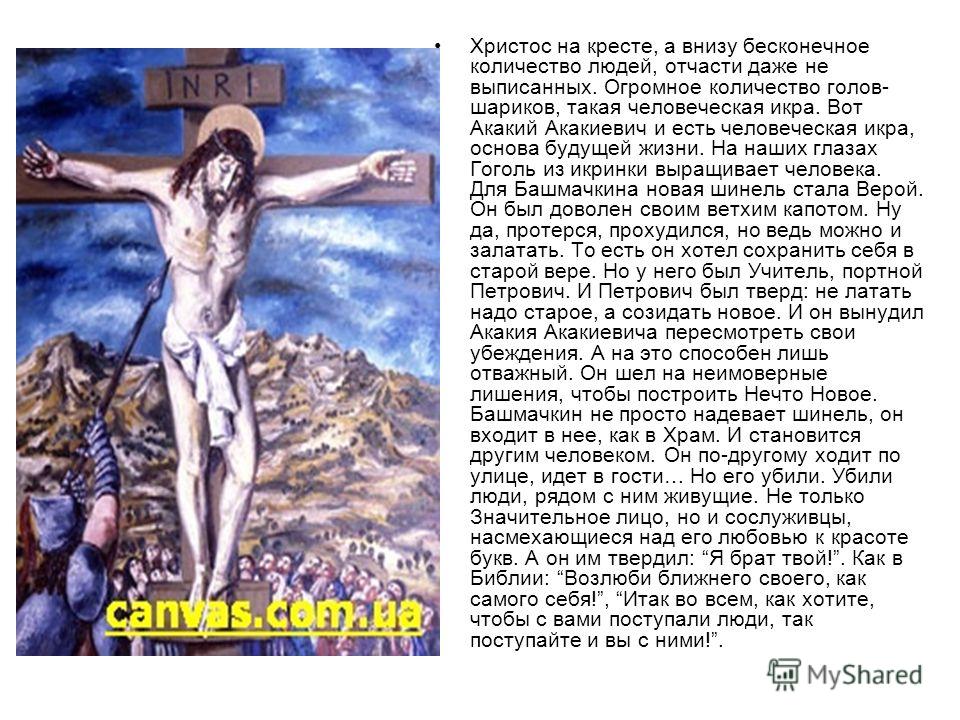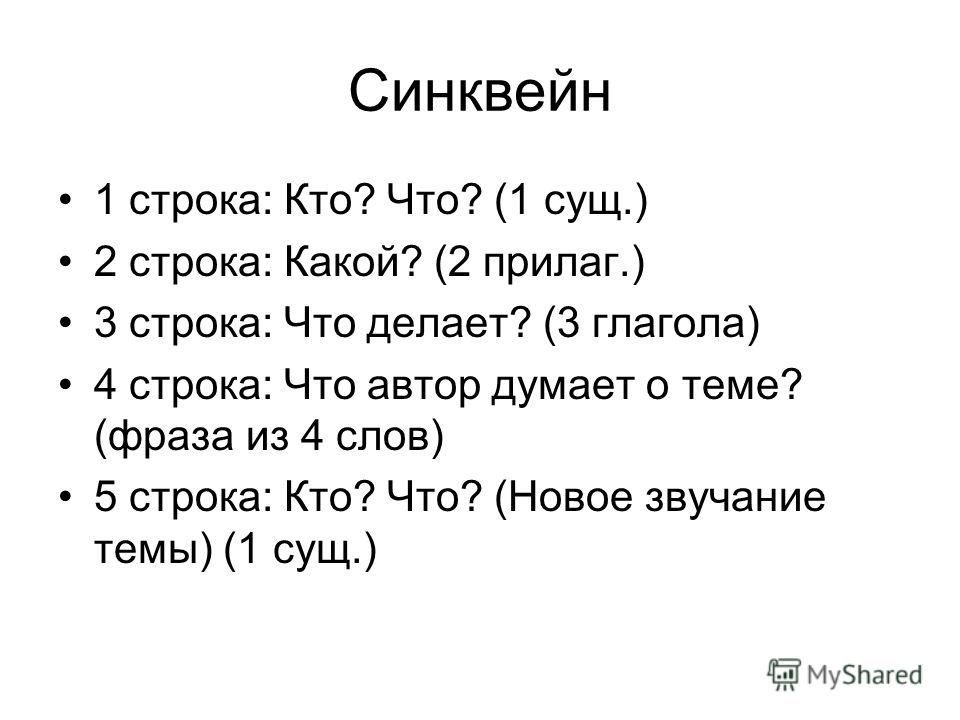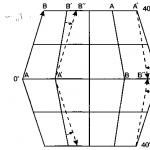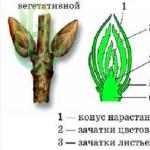The most enigmatic figure in Russian literature If you want to know something about Russia, if you want to understand why the chilled Germans lost their blitz (the war with the USSR), if you are interested in ideas, facts, trends, don't touch Gogol. Hard labor in learning the Russian language, necessary in order to read it, will not be paid for with the usual coin. Don't touch him, don't touch him. He has nothing to tell you. Don't go near the rails. There is high voltage. V. Nabokov
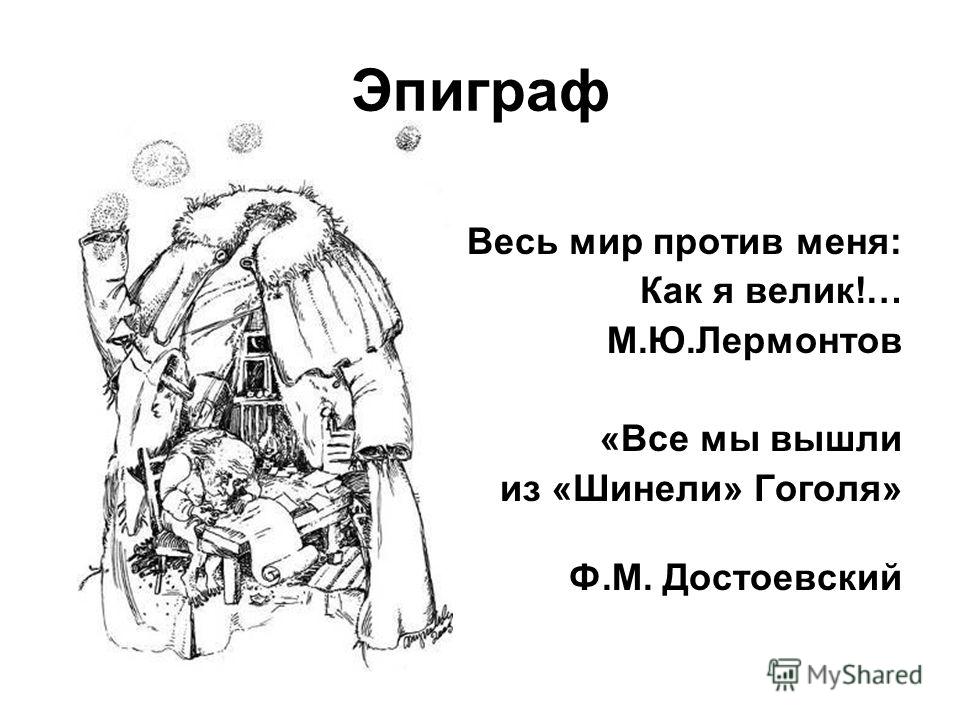
Why depict poverty ... and the imperfections of our life, digging people out of life, from the remote corners of the state? ... no, there is a time when otherwise it is impossible to aspire society and even a generation to the beautiful, until you show the full depth of its real abomination to N.V. Gogol
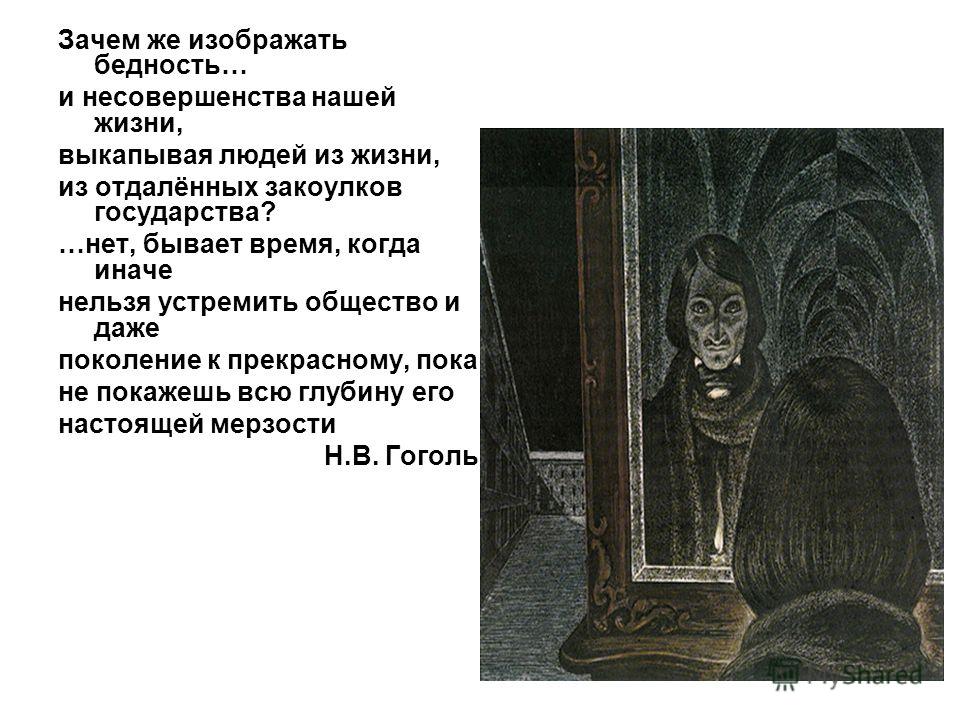
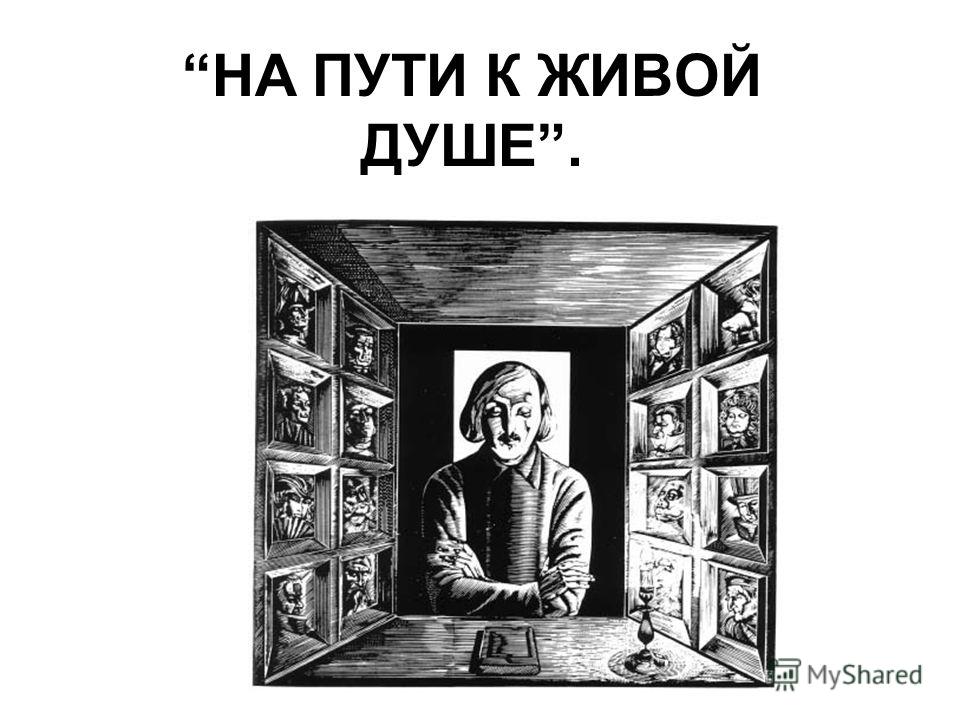
The parable of a man On a hot summer day, the ancient Athenians saw Demosthenes in the square with a burning lantern in his hands. “What are you looking for?” they asked. “I am looking for a man,” Demosthenes answered, and continued on his way. After a while, the Athenians again turned to Demosthenes: - So what are you looking for, Demosthenes? -I'm looking for a person... -Whom: him, me..? - I'm looking for Che-lo-ve-ka!
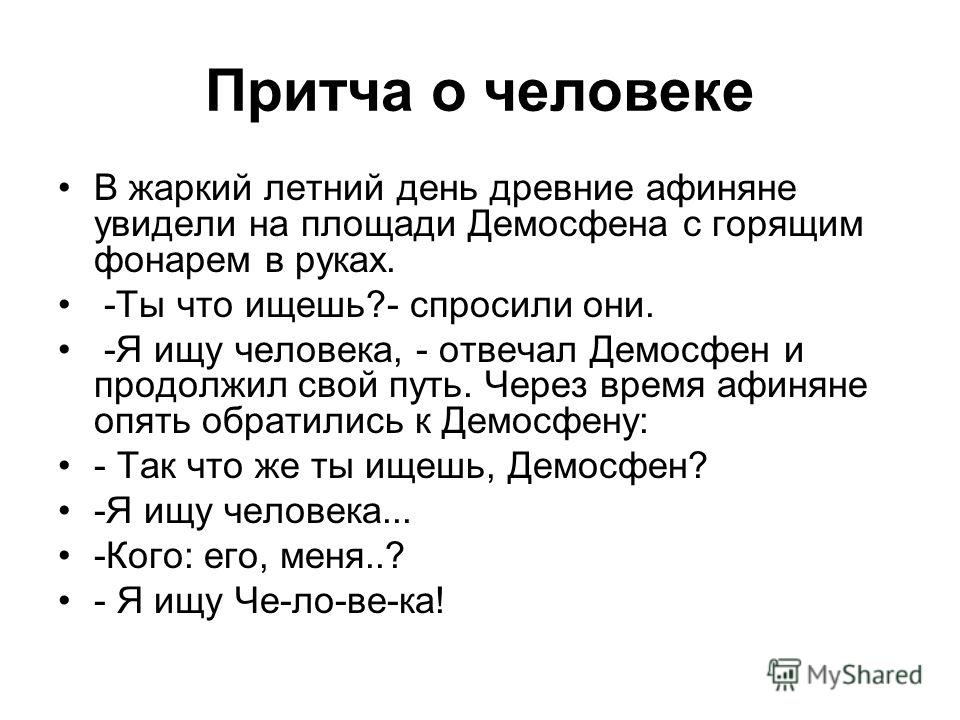

As through the story Overcoat, the writer was looking for a way to the living soul. - Can a soul be dead? No, the soul is immortal. - Well, if it is dead, it means that it is closed to light, love, goodness. Such stillborn characters inhabit Gogol's poem. The writer did not find a counterweight to them in life, and therefore burned the second volume of Dead Souls. The realization of this drove Gogol to madness. The thought of a man whose soul was breathed into by God, and whose fate is often determined by the devil, apparently did not leave Gogol. This topic, in fact, is devoted to St. Petersburg stories.
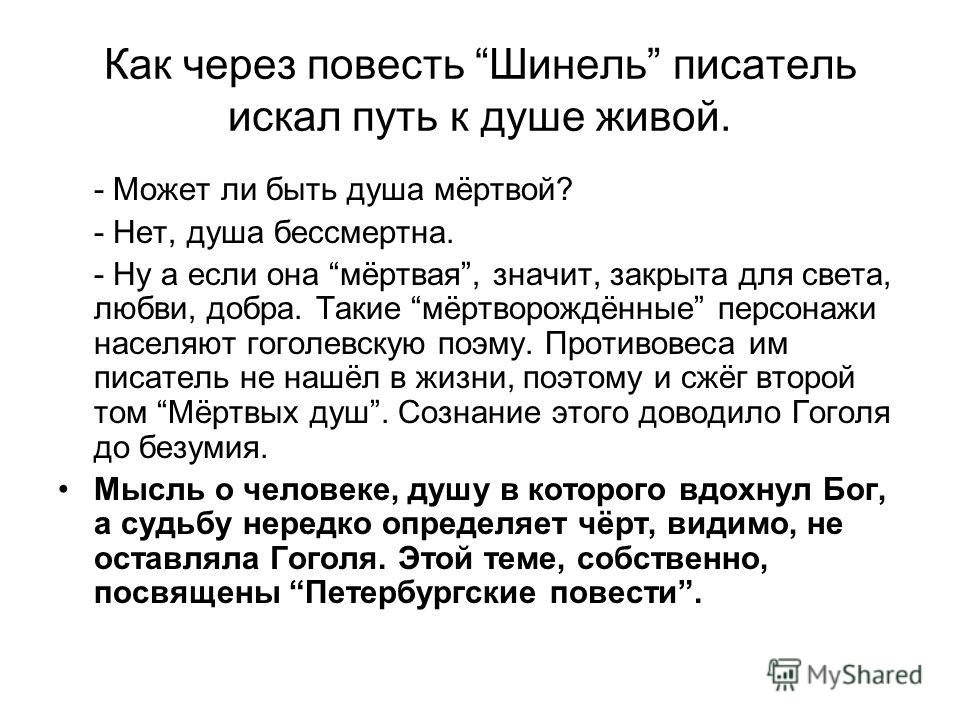
Petersburg stories a new step in the development of Russian realism. This cycle includes the stories: Nevsky Prospekt, Nose, Portrait, Carriage, Notes of a Madman and Overcoat. The writer works on the cycle between 1835 and 1842. The stories are united according to the common place of events - Petersburg. Petersburg, however, is not only a scene of action, but also a kind of hero of these stories, in which Gogol draws life in its various manifestations. Usually writers, talking about life in St. Petersburg, covered the life and characters of the nobility, the top of the capital's society. Gogol was attracted by petty officials, craftsmen (the tailor Petrovich), impoverished artists, little people, unsettled by life. Instead of palaces and rich houses, the reader in Gogol's stories sees city shacks in which the poor huddle.
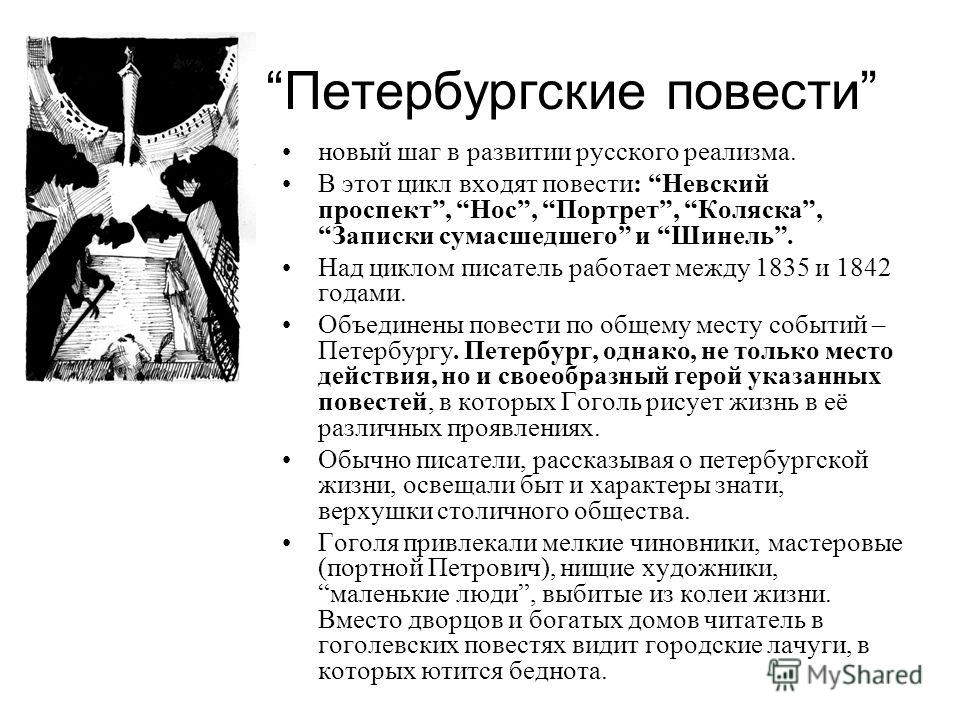
“little man” is a man humiliated, defenseless, lonely, powerless, forgotten (and, by all, and if I may say so, by fate), miserable. - In the literary encyclopedic dictionary, we find the following definition: “little man” in literature is a designation for rather heterogeneous heroes, united by the fact that they occupy one of the lowest places in the social hierarchy and that this circumstance determines their psychology and social behavior (humiliation, combined with a sense of injustice wounded by pride.
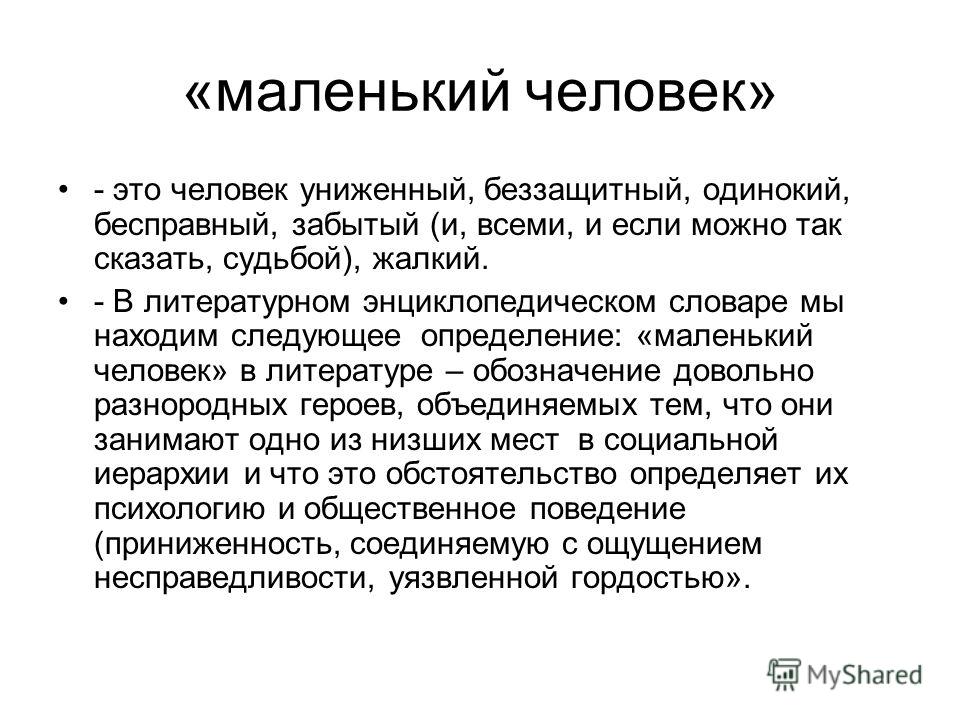
The theme of human suffering, predetermined by the way of life; little man theme. N. M. Karamzin Poor Lisa - in the center of the story is a simple, uneducated peasant girl; we are inspired with the idea that peasant women know how to love! AS Pushkin Stationmaster Samson Vyrin, a poor official of the fourteenth grade, has no rights in life, and even the only meaning of his existence - his beloved daughter - is taken away from him by the powers that be. A. S. Pushkin The Bronze Horseman - the main character - the unfortunate, destitute Eugene, whose poverty destroyed both character and mind, made thoughts and dreams insignificant. All these works are full of love and sympathy of the authors for their heroes. Gogol develops the traditions of the great Russian writers in the depiction of a small man).

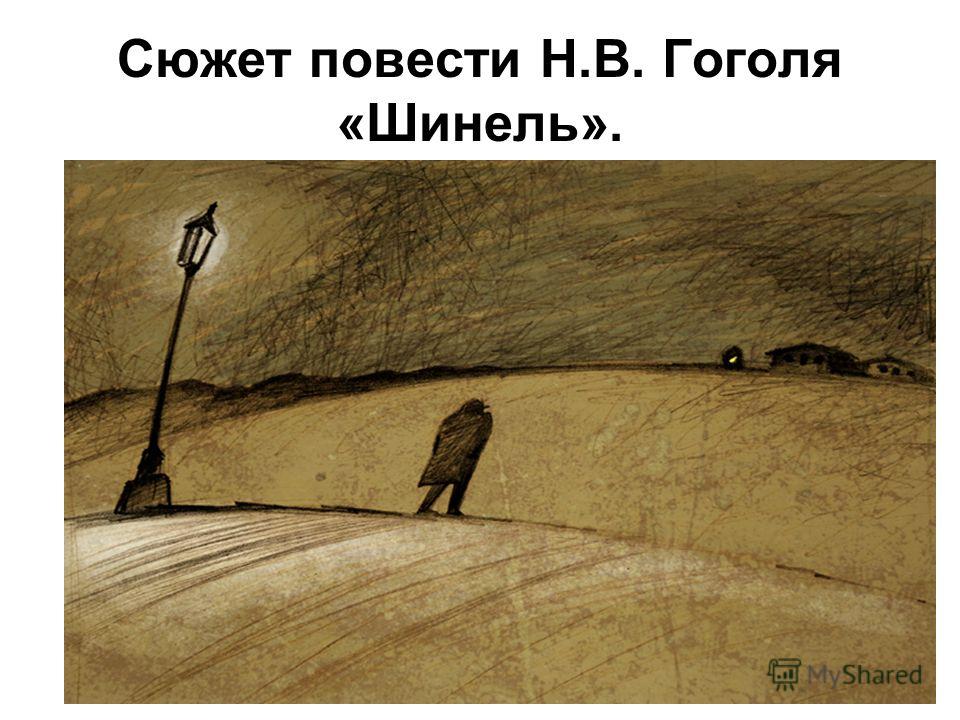
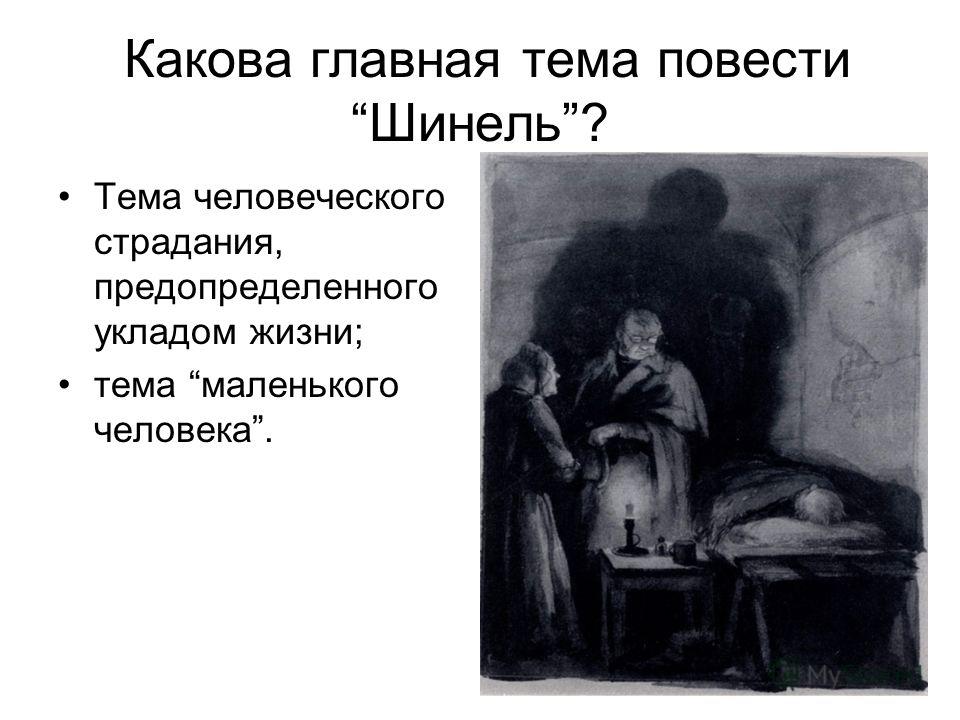
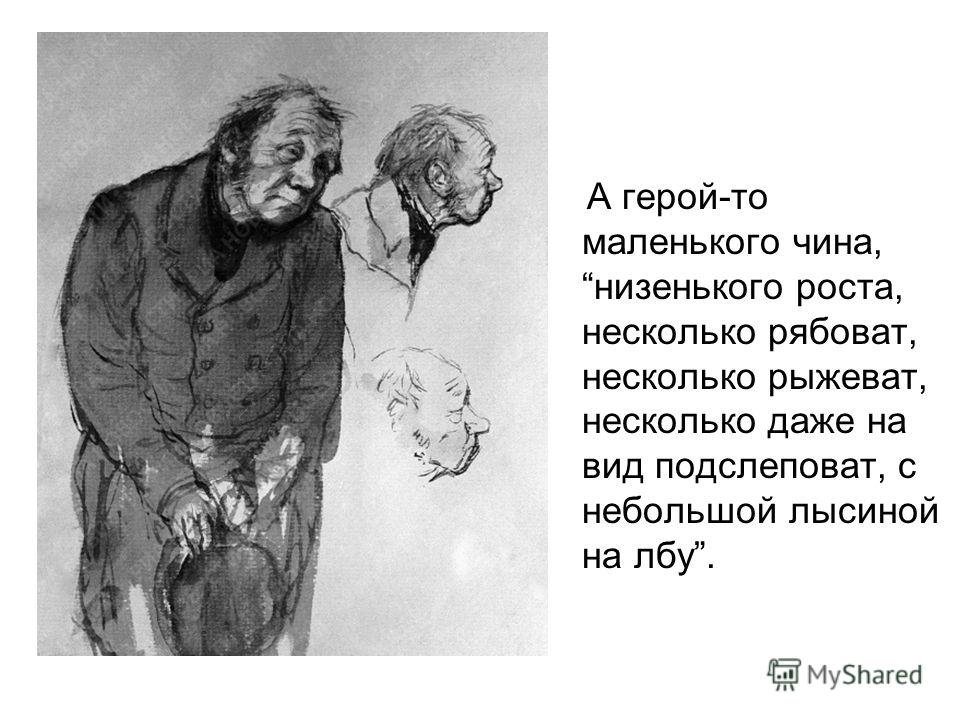
How is the typical character and situation emphasized? ... served in one department, ... when and at what time he entered the department ... no one could remember this, one official ... - all these phrases do not show the exclusivity, unusualness of the situation and the hero, but their typicality. Akaky Akakievich is one of many; there were thousands like him - useless officials.

What is the personality before us? Describe the main character. The name Akakiy, translated from Greek, is gentle, and the hero has the same patronymic, that is, the fate of this person was already predetermined: such was his father, grandfather, etc. He lives without prospects, does not recognize himself as a person, sees the meaning of life in rewriting papers ...
![]()
There was no respect for him in the department, and the young officials laughed and joked at him, poured small pieces of torn papers on his head ... And once the joke was too unbearable, he said: Leave me, why are you offending me? And something strange lay in the words and in the voice in which they were uttered. In these penetrating words others rang: I am your brother! And since then, as if everything had changed in front of me and seemed to me in a different form, often in the midst of the most merry moments I imagined a short official with a bald spot on his forehead with his penetrating words: Leave me, why do you offend me? ...
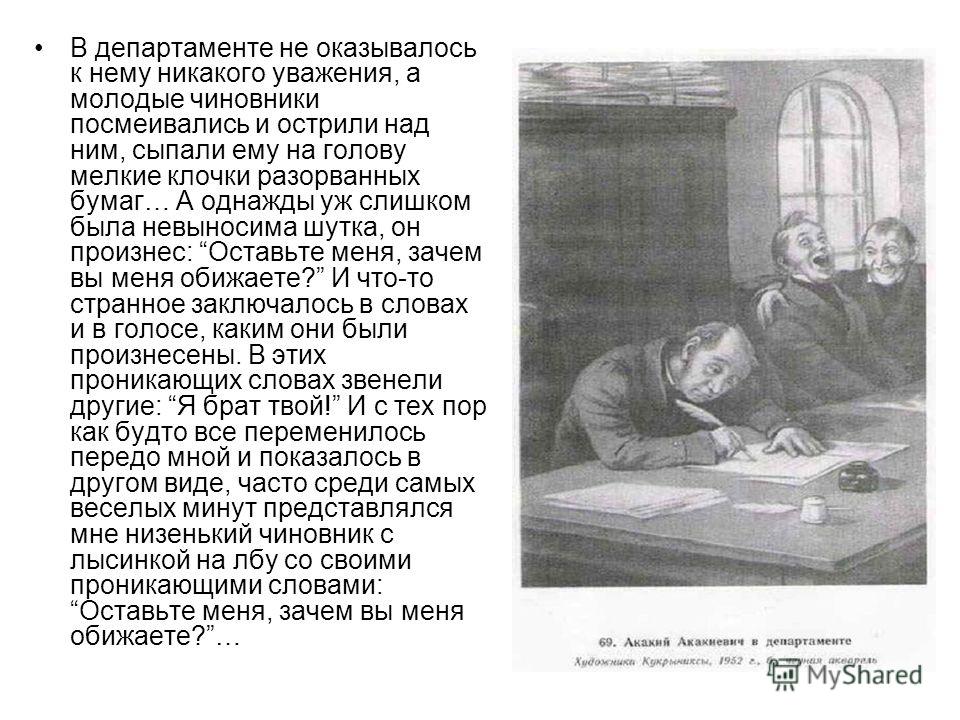
What was the acquisition of an overcoat for Bashmachkin? What is he going to do for this? An overcoat for Akaky Akakievich is not a luxury, but a hard-won necessity. The acquisition of an overcoat colors his life with new colors. This, it would seem, humiliates him, but what he goes to for this, changes the entire familiar coordinate system in our minds. From every ruble spent, he set aside a penny in a small box, in addition to this savings, he stopped drinking tea and lighting candles in the evenings, and, walking along the pavement, he stepped on his toes so as not to abrade his soles ... He also, when he came home, immediately took off his linen, so as not to wear out, and sat in a shabby dressing gown. We can say that he LIVED a dream of a new overcoat.
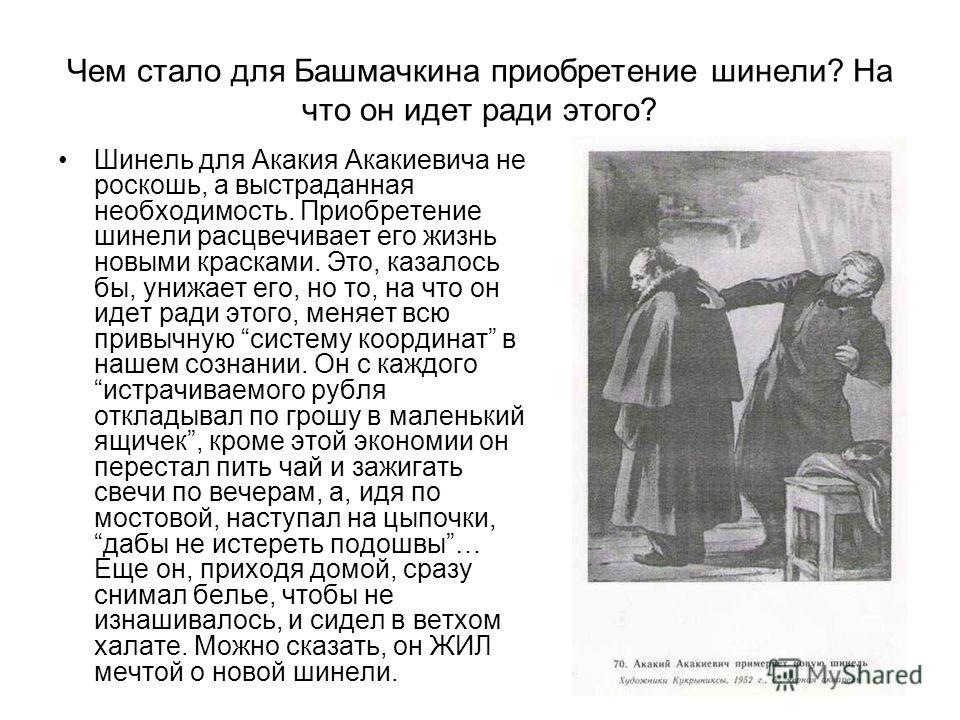
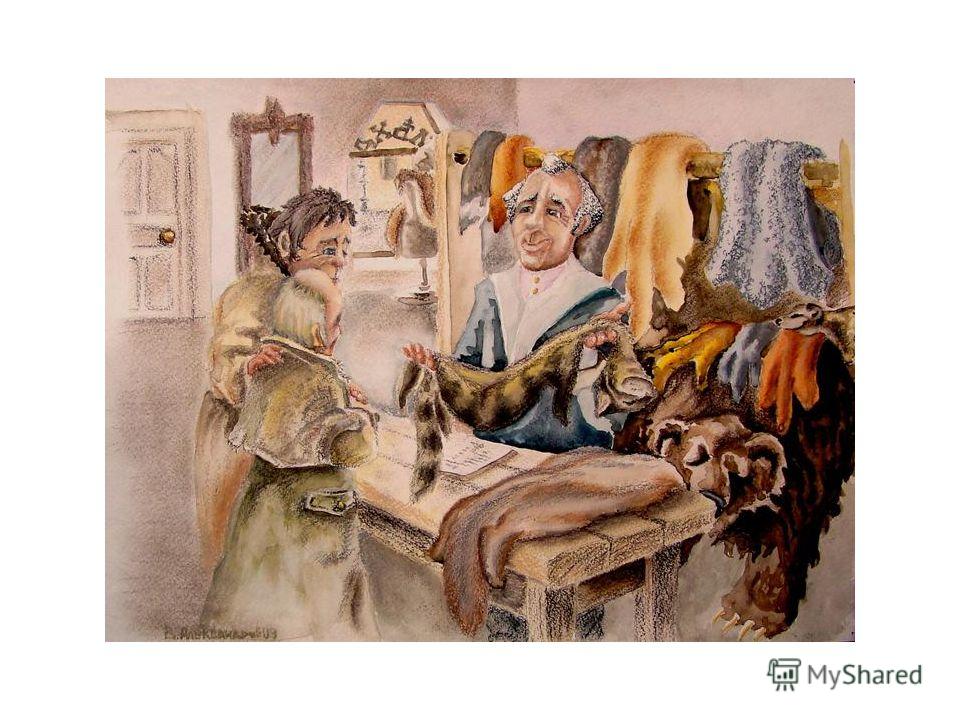
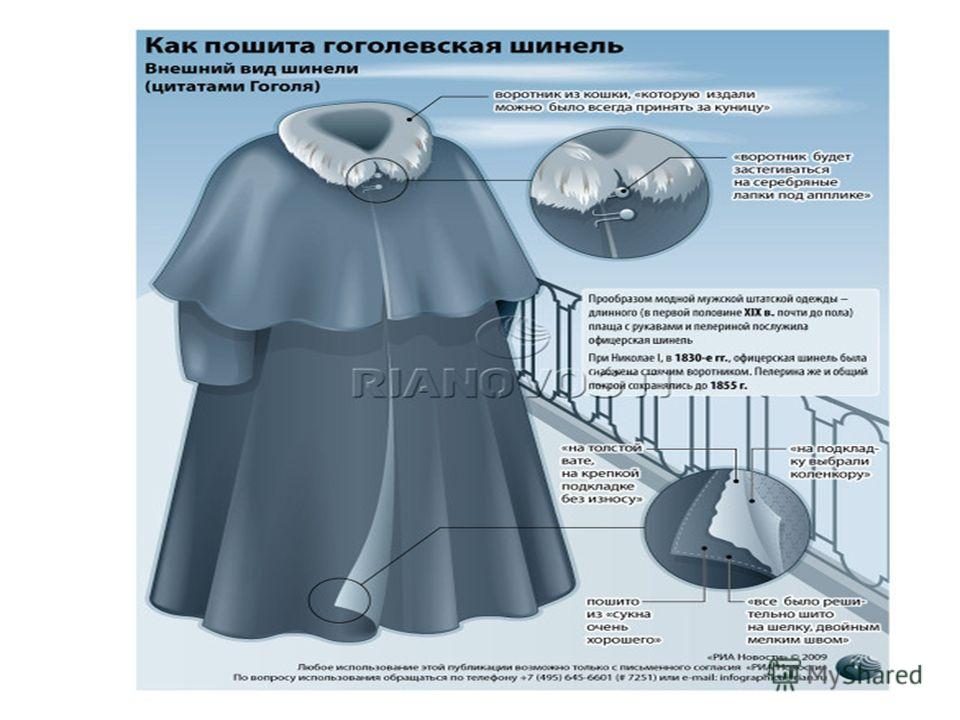
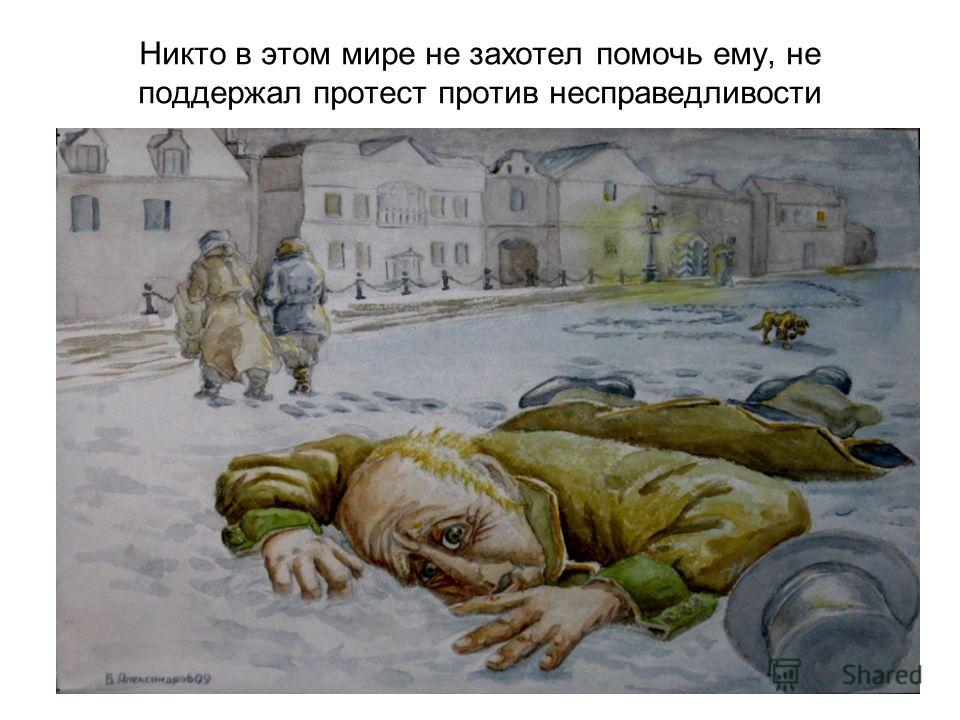
What is the purpose of Gogol's introduction of a fantastic finale? Bashmachkin dies not because of the theft of his overcoat, he dies because of the rudeness, indifference and cynicism of the world around him. The ghost of Akaky Akakievich acts as an avenger for his unlucky life. This is a rebellion, although it can be called a kneeling rebellion. The author seeks to evoke in the reader a feeling of protest against the absurd conditions of life and a feeling of pain for the humiliation of human dignity. Gogol does not want to give a consoling denouement, he does not want to appease the reader's conscience.
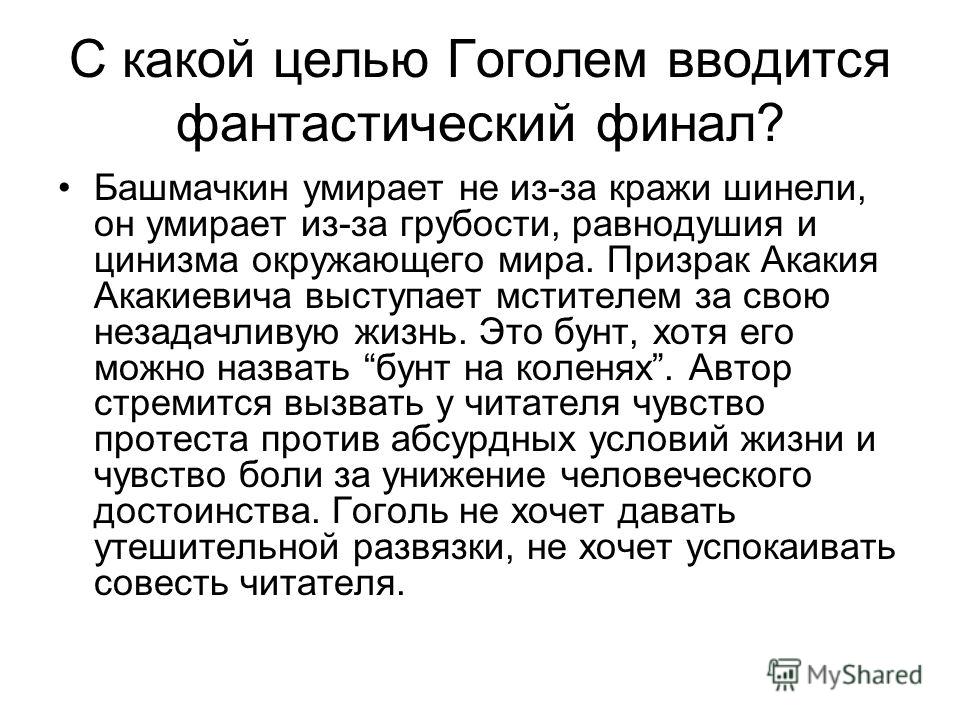
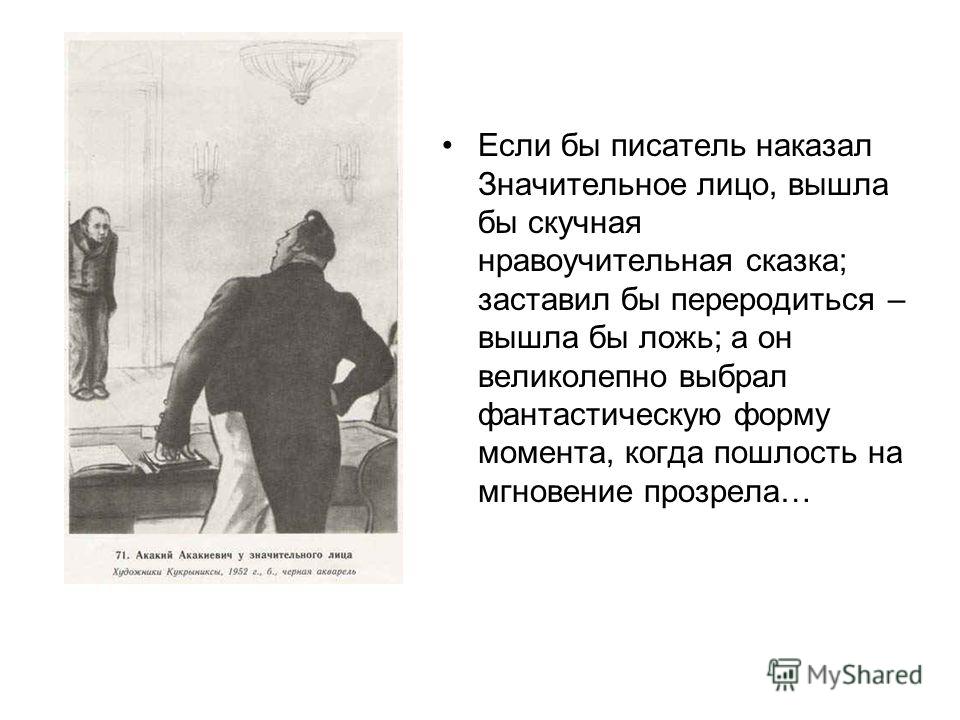
Gogol appeals to a living soul, because most often there are pork snouts around, as in a nightmare of the hero of the comedy The Inspector General. Scary from dead souls. Words from Chekhov's story Gooseberry: It is necessary that behind the door of every happy person there should be someone with a hammer and reminded of the unfortunate and destitute, of the vulgarity in our lives, of little people.
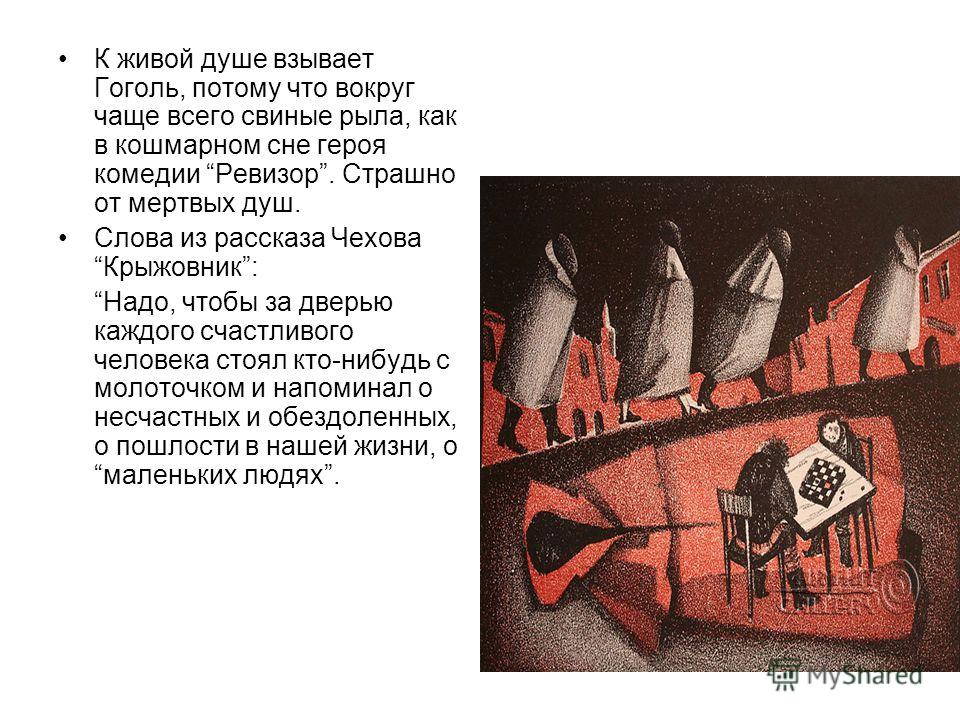
The story would have produced the most hopeless impression, if it were not for the light emanating from the most miserable, worn out, insignificant. How not to remember the Gospel: Blessed are the poor in spirit, for theirs is the Kingdom of Heaven. Blessed are those who mourn, for they will be comforted. Blessed are the meek, for they shall inherit the earth. Blessed are the merciful, for they shall receive mercy. Blessed are the pure in heart, for they shall see God.
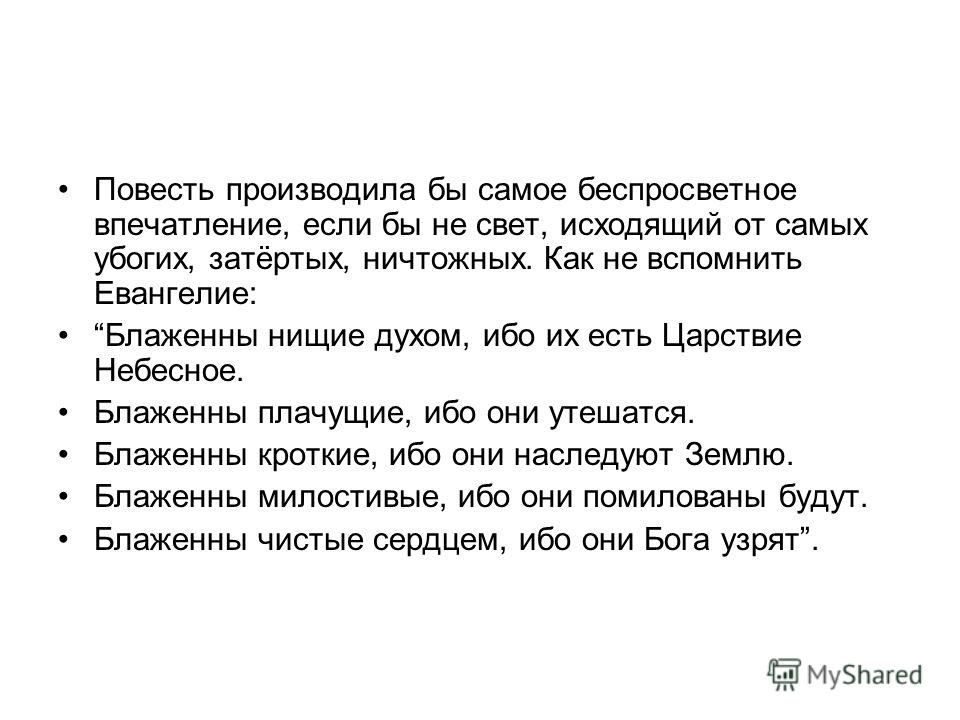
Christ is on the cross, and below is an infinite number of people, partly not even discharged. A huge number of heads-balls, such a human caviar. Here Akaky Akakievich is the human caviar, the basis of the future life. Before our eyes, Gogol grows a man from an egg. For Bashmachkin, the new overcoat became Vera. He was pleased with his ramshackle hood. Well, yes, I’ve worn out, I’ve lost weight, but you can also patch it up. That is, he wanted to keep himself in the old faith. But he had a Teacher, a tailor Petrovich. And Petrovich was firm: the old should not be patched up, but the new should be created. And he forced Akaky Akakievich to reconsider his beliefs. And only the brave can do it. He went to incredible hardships to build Something New. Bashmachkin does not just put on an overcoat, he enters it, as if into a Temple. And becomes a different person. He walks down the street in a different way, goes to visit ... But he was killed. The people living next to him were killed. Not only a Significant Person, but also colleagues who mock his love for the beauty of letters. And he told them: I am your brother! As in the Bible: Love your neighbor as yourself! So in everything you want people to do to you, do the same to them!
